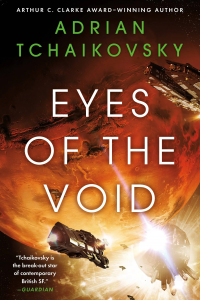Paul Di Filippo reviews Will McIntosh
Faller, Will McIntosh (Tor 978-0-7653-8355-6, $25.99, 352pp, hardcover) October 2016.
 I have consistently praised Will McIntosh for the freshness of the novum in each of his books, the core speculative “what if” or “why not” concept that serves as the engine of the story. I think he and Adam Roberts are running neck and neck in this amiable contest to conceive of startling derangements or extensions of reality. And the inability or unwillingness of each man to repeat himself is almost as astonishing. They really have no peers in the SF field, so far as piquant novelty extends.
I have consistently praised Will McIntosh for the freshness of the novum in each of his books, the core speculative “what if” or “why not” concept that serves as the engine of the story. I think he and Adam Roberts are running neck and neck in this amiable contest to conceive of startling derangements or extensions of reality. And the inability or unwillingness of each man to repeat himself is almost as astonishing. They really have no peers in the SF field, so far as piquant novelty extends.
But of course, a lot more goes into making a great SF novel than just a highly original conceit. You have to add all the virtues of mimetic fiction and a heaping quantity of heart, soul and empathy. Luckily for us, McIntosh excels here as well.
Let’s see how he does it in his newest offering.
On the first page our hero awakes, laid out on a street, with a kind of widespread yet selective amnesia. He knows many things, but not his name nor his personal history nor the history of his world. There are other bewildered people in the same fix all around him. What he learns is this: his world is a mere fragment of urban landscape with definable edges, “nineteen thousand steps long and ten thousand steps wide.” Beyond and below the ragged edges of the floating island is naught but empty atmosphere. The sun, moon and stars remain fixed above. Our hero possesses a few clues to his past on his person: a scribbled enigmatic schematic, a photo of himself with a woman, and a toy solider with toy parachute.
What ensues immediately over the next several chapters is the kind of post-apocalypse devolution into barbarism scenario familiar from such classics as The Shape of Things to Come and The Day of the Triffids, modulated by the bizarre topographical circumstances. But while struggling to stay alive, our hero, naming himself “Faller,” also strives to puzzle out the existential nature of his predicament. And this quest is going to lead him down the rabbit hole, from island to island. (One can only hope that Roger Dean, the famous artist of such imagery, does not foolishly sue, as he did in the case of Avatar!)
After a good buildup of this venue and the characters, the narrative switches POV to a time that seems to be our near-future. Two scientists, Peter and Ugo, are striving to perfect “quantum cloning” via a laboratory-fashioned wormhole, while the political scene devolves into war and plagues around them. From this point on, our tale will move along these parallel tracks. In the inexplicable continuum, Faller, true to his name, eventually departs his Swiftian Laputa on the start of a long journey. And in that countdown to doomsday future, Peter and Ugo and the rest of their companions experience rivalries, scientific successes and failures, and eventual armageddon, for which the two men both bear some culpability.
I can’t legitimately detail as spoilers all of Faller’s adventures, nor all of the machinations of Peter and Ugo & Co. As any trained reader will expect, the events of the past era will be shown to lead directly to the reality of the Faller era. But precisely how this happened and what the exact outcome is must remain unrevealed here, in order for you to delight in McIntosh’s cleverness. Suffice it to say that the two timelines converge and dovetail elegantly and with precision and surprise.
Naturally, with Faller being foregrounded, our main sympathies are with his fate, and here McIntosh delivers superbly. He puts his stubbornly valiant and loyal hero through incredible excruciations, an almost constant barrage of challenges. Really, the poor guy barely gets a minute’s rest! His basic plight and quest (for self-knowledge, and eventually to rescue the world) reminded me a bit of one of my favorite Keith Laumer tales, “The Day Before Forever.” At his best, Laumer was, in my opinion, a writer capable of creating great propulsive suspense. His works today are underrated or, if recalled at all, lifted out of their proper hierarchy. McIntosh is a much more elegant master of prose, but I’d dare to praise him as something of a modern-day Laumer. In any case, this book races along to a highly rewarding ending, a blend of sacrifice and reward, despair and hope.
This kind of cosmological paradigm shift occurring on our own planet is hard to pull off, and consequently does not get a lot of play in the genre. (A more common and allied scenario is “strange alien environment,” such as that in Stephen Baxter’s Raft, Karl Schroeder’s Virga cycle, and Larry Niven’s The Integral Trees.) Classic examples include L. Sprague de Camp’s “The Isolinguals” and Jack Vance’s “The Men Return.” Michael Bishop’s “The Quickening” is another revolutionary concept, while Matthew Hughes has been playing in his Henghis Hapthorn series with a far future setting that is transitioning from a basis in physics to one in magic—the reverse of Larry Niven’s setup in The Magic Goes Away. And to bring up Adam Roberts once more, his Twenty Trillion Leagues Under the Sea features a world of equal deracination and topological complexity. I even detect in McIntosh’s newest some flavors of Philip José Farmer, from the Riverworld and the World of Tiers series.
As for the scenario with Peter and Ugo, I wonder if McIntosh is not paying sly homage to Jonathan Lethem’s As She Climbed Across the Table.
Whatever old classics may or may not have influenced McIntosh, the novel he produced is utterly state-of-the-art SF, with bold new ideas, old-school action, and characters whom you will root wholeheartedly for. Prepare to fall from great heights into unknown territory.




